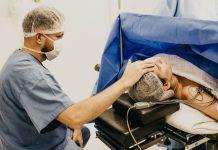Disclaimer :: Once again, Dr. Catherine Bevan shares her expertise with FWMB in this sponsored blog post on postpartum care.
Congratulations, you just had a baby!!! Now what?! The postpartum period begins with the delivery of the baby and placenta and continues six to eight weeks after delivery. This joyful, yet totally exhausting, time is critically important for both the new mother and the baby.
Being an obstetrician, my expertise is around maternal care, and I will leave the baby matters to my esteemed pediatrician colleagues. In this post, I want to briefly go over some issues that new mothers may deal with in the postpartum period.
Pain. Pain is the most common complaint after both vaginal or cesarean delivery. Pain can be from many different sources, so I will address some of the more common causes of postpartum pain. First, the uterus after a delivery is still quite large (usually the top will be around the belly button). Over the course of 6-8 weeks following delivery, the uterus will reduce in size and go back into the pelvis completely. This causes a cramping feeling. Motrin, or other NSAIDs, are the best thing for this type of pain. Often, I will tell patients to schedule this medication for the first week postpartum (i.e. take every 8 hours regardless of pain scale) to have a good baseline control of this crampy pain. This pain is frequently worse with milk let down because the same hormone that helps milk let down from the breast also causes uterine contractions (this is evolutionarily quite important to help breastfeeding while also stop bleeding from the uterus!). Incisional pain from a cesarean delivery is helped by Motrin, but also usually requires Norco or Tylenol for adequate pain control. Incisional pain should get better and better every day, but some numbness around the incision site can persist for weeks to months following surgery.
Vaginal pain from lacerations is treated with pain medications, but also is improved with cold compresses (the hospital will usually have these available, but I also like recommending soaking an overnight maxi-pad in witch hazel and freezing it for this purpose as well). Also, sitz baths keep the area clean while also providing some pain relief. The other very common type of pain after delivery is from constipation. Which brings me to . . . .
Bowel and bladder issues. An important, albeit unglamorous topic! There is potential for almost any type of issue when it comes to voiding, from difficulty peeing/pooping to flat-out incontinence. Fortunately, most of these issues tend to resolve on their own after a period of days to weeks, so treatment is typically directed at symptom relief. I like to recommend a stool softener postpartum to help prevent constipation after delivery. Also, work on those kegel exercises both during but especially after delivery to help prevent incontinence and strengthen the pelvic floor.
 Bleeding. The baby and placenta aren’t the only things in a pregnant uterus. In the period following childbirth, the lining of the uterus is gradually sloughed off and replaced by the usually present endometrium. This shedding is referred to as lochia and will cause bleeding and discharge for several weeks after delivery as the uterus shrinks to about six percent of its size. Mesh panties lined with hospital pads are usually best for this in the first few days, followed by super-absorbent maxi pads in following days to weeks.
Bleeding. The baby and placenta aren’t the only things in a pregnant uterus. In the period following childbirth, the lining of the uterus is gradually sloughed off and replaced by the usually present endometrium. This shedding is referred to as lochia and will cause bleeding and discharge for several weeks after delivery as the uterus shrinks to about six percent of its size. Mesh panties lined with hospital pads are usually best for this in the first few days, followed by super-absorbent maxi pads in following days to weeks.
Breast issues. Swelling of the breasts is very common after delivery and can be due to both accumulated milk as well as tissue swelling. This is termed breast engorgement, and it can cause a lot of discomfort. Cool compresses or ice packs can help alleviate symptoms, as well as regular feedings for breastfeeding moms. Nipple pain and injury can also occur, which may lead to earlier than desired cessation of breastfeeding or possible infection (mastitis). Lactation consultants can really help to ensure that latching is optimized to allow for nipple healing.
Sex. Hormones start to return to their normal levels in the weeks following delivery, and the desire for sex should coincide with this. Once your healthcare provider has determined it’s okay to resume sexual activity (usually six weeks after delivery), there are a few things to keep in mind. For one, contraception is important. If not exclusively breastfeeding, ovulation can occur as early as 25 days after delivery. Even if breastfeeding, future contraception counseling should be initiated by your provider either in the hospital before discharge or at the first postpartum visit.
Lack of desire is another issue. Many factors contribute to a low libido, commonly including perineal trauma, complicated deliveries, low estrogen and lubrication levels (particularly an issue with breastfeeding moms), and fatigue. Being upfront with your concerns will help resolve any issues you may be experiencing.
Mental health. Thankfully, mental health has become a less taboo topic over the past several years, and for good reason. Postpartum depression is a common problem that many women face and all women should be screened for postpartum depression after delivery.
As a mother of two children, I know the feeling that comes after delivery; nothing else in the world matters except this precious human that I brought into the world. Of course, sacrifices will be made, but new mothers must remember to take care of themselves in addition to their newborns. The adage that time heals all wounds is somewhat relevant in the postpartum period, but making yourself comfortable will make this time more pleasant. Don’t be afraid to lean on friends and family for support and be sure to address any health concerns with your provider!
 Dr. Catherine Bevan is a board certified obstetrician and gynecologist, who practices in Tarrant County, with offices in Fort Worth and Willow Park. She is a Fort Worth native and received her Bachelor of Arts degree from Washington University in St. Louis where she graduated cum laude, Phi Beta Kappa. She then returned to Texas to complete her medical degree at UT Southwestern as well as her residency training at Parkland Memorial Hospital. She also spent an additional year as an assistant professor at UT Southwestern, specializing in gynecologic surgery and emergency women’s care. Providing excellent service to her patients is a passion for her as she guides them to the best possible healthcare outcomes.
Dr. Catherine Bevan is a board certified obstetrician and gynecologist, who practices in Tarrant County, with offices in Fort Worth and Willow Park. She is a Fort Worth native and received her Bachelor of Arts degree from Washington University in St. Louis where she graduated cum laude, Phi Beta Kappa. She then returned to Texas to complete her medical degree at UT Southwestern as well as her residency training at Parkland Memorial Hospital. She also spent an additional year as an assistant professor at UT Southwestern, specializing in gynecologic surgery and emergency women’s care. Providing excellent service to her patients is a passion for her as she guides them to the best possible healthcare outcomes.
You can read more from Dr. Bevan on the Fort Worth Moms Blog archives.
Please visit her websites for more information: www.healthcareoftexas.com and www.txhealthcare.com.
You can contact Dr. Bevan at:
- 1250 8th Avenue, Ste 320 // Fort Worth, TX 76104 // (P) 817-924-2111 // (F) 817-564-3980
- 134 El Chico Trail, Suite 103 // Willow Park, TX 76087 // (P) 817-441-1644 // (F) 817-441-1626













